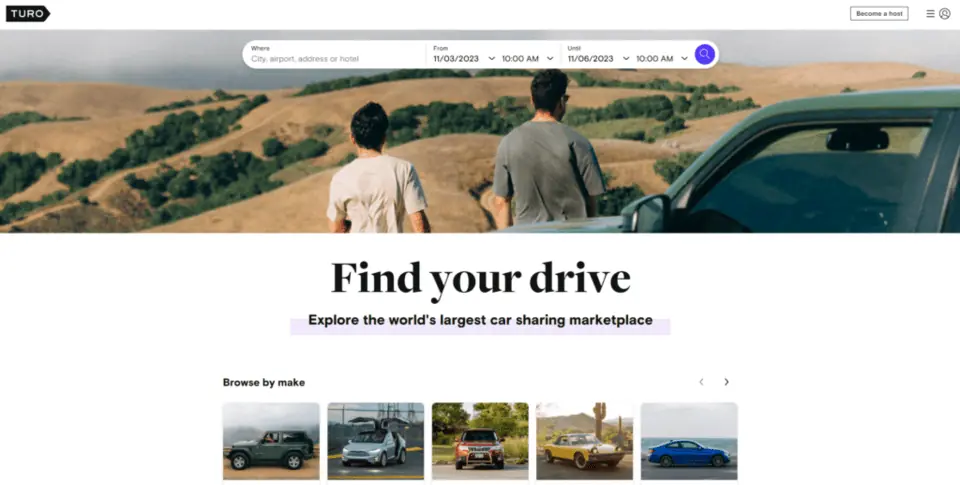Key Takeaways
- Turo connects car owners with renters, bypassing traditional rental companies.
- Users sign up, choose a car, and meet owners for keys.
- Offers safety via driver screenings, reviews, and up to $750,000 insurance coverage.
- Car owners earn extra income by renting out vehicles with customizable protection plans.
What is Turo?
Turo is an online car rental marketplace that connects car owners with renters, bypassing traditional rental companies. It offers a peer-to-peer model that reduces fees and provides greater flexibility and convenience.

Users can select a vehicle from the platform, meet the owner, and directly receive the keys, eliminating the need for dealing with car rental offices, high prices, and complex paperwork.
Turo offers a wide range of vehicles, from limousines to trucks and convertibles, and operates in several countries, including the U.S., Canada, England, and Australia. This service allows for easy car rental similar to booking a hotel room or an Uber.
How Does Turo Work for Renters?
To use Turo as a renter, you first download the app and sign up, ensuring your information is accurate for safety reasons.
The app’s user-friendly interface allows you to search for cars based on location, model, or specific features. Car listings include detailed vehicle information and renter expectations, such as mileage limits.
It’s advisable to contact the car owner to discuss trip details and pickup locations. Turo features renter and host reviews to ensure trustworthiness.
The cost of using Turo is determined by the host and varies based on the rental period. Turo’s fee ranges from 2.25% to 100%, with a minimum of $15. Renters have the flexibility to rent vehicles for short terms like day trips or for extended periods, such as weeks.
Advantages of Using Turo
Here are all the reasons why Turo should be your go-to vehicle rental service:
- Lower Cost: Turo’s rental plans are rather economical, compared to traditional car rental agencies. You can even claim a Turo promo code, further reducing the cost of the trip.
- Personalized Experience: With Turo, you can choose a convertible, a pet-friendly vehicle, or a green electric car to reduce carbon emissions. Regardless of your preference, Turo will probably have it.
- Variety of Vehicles: Not only can you find some of the best cars on Turo, but the huge platform allows you to pick between different makes, colors, and hosts. The options are endless.
- Flexibility: Traditional rental companies are limiting, particularly with the dropoff and delivery locations. Since you’ll be dealing directly with vehicle owners on Turo, you can set up comfortable exchange hours. Turo also allows you to unlock the car without needing to meet the host!
Safety and Trust on Turo
Turo is one of the most reliable rental services in the car rental industry. First, they conduct driver screenings, as well as have a review section. This way, both guests and hosts can have a trustworthy experience.
The service also offers various protection plans for guests and hosts. Turo is safe, with insurance. However, you can choose a personal insurance plan rather than going for Turo’s.
For guests, Turo’s insurance coverage can reach up to $750,000. Hosts could receive up to $750,000 in liability coverage. Accordingly, Turo insurance is a must.
Turo for Car Owners
If you own a car, but don’t get to use it often, or you’re traveling out of town, why not make some extra income by renting it out?
With Turo’s protection plans and background checks, you’ll know your vehicle is in good hands. Vehicle owners can even only deal with drivers who have positive reviews on the app.
Turo has various rental options and plans for hosts, allowing them to set the price that best fits their needs.
For example, the 60 plan allows hosts to keep 60% of the rental price, and deduct 40% for the protection plan and Turo fees. This way, hosts aren’t charged any fees in order to sign up or list their vehicles. Overall, it’s worth it.
Frequently Asked Questions
Do you get your money back with Turo?
You can get your money back with Turo if you cancel at least 24 hours before the trip starts. If you’ve booked a trip within 24 hours, you have an hour to cancel and get a full refund.
Otherwise, Turo charges guests a cancellation fee equal to one day of the average trip price. However, if your trip is shorter than two days, the cancellation fee is only half a day.
What does Turo do if the car breaks down?
Turo offers 24/7 roadside assistance in case of an accident or if the car breaks down. You should remain near the vehicle until assistance arrives. If you abandon the car, Turo will charge you $40.
The roadside assistance is completely free of charge. Still, the host could file a physical damage claim if they find you responsible.
Why won’t Turo accept my card?
While Turo accepts all debit and credit cards from any bank, you could face issues if you’re using a prepaid card other than Revolut. You also need to ensure your billing address is correct. Then, the service should process your payment smoothly.
Wrapping Up
What is Turo?
Turo is one of the best online peer-to-peer car rental services around. It gives both drivers and hosts complete flexibility.
The system is easy to use. All hosts need to do is choose one of Turo’s protection plans, depending on whether they want to pocket more or keep their vehicle protected.
As for drivers, they can search through thousands of unique options, filtering them based on their unique needs.






